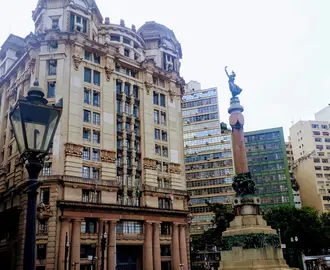Recently, a team of students taking MIT Sloan Action Learning’s Entrepreneurship Lab (E-Lab) tackled an ambitious project for Floodlight, a geospatial data intelligence company that analyzes data collected by ground sensors, aerial satellites, and artificial intelligence to provide companies with insights for ESG governance.
The E-Lab team was asked to identify potential new market segments for Floodlight and design extensive potential customer discovery interviews. What followed was an irreplaceable lesson in data collection from the Floodlight team.
“They were very transparent about how they actually do this process, how they collect data, and how to interact with it. They were very open about new techniques. We had weekly meetings, and they gave us feedback very quickly,” says Faraz Faruqi, PhD ’26.
Understanding customers’ ESG data needs
The team segmented Floodlight’s market by auditors and consultants, determining which ones would be most affected by environmental regulatory frameworks and which ones worked with companies that had made marketable net-zero pledges.
To understand how to penetrate more markets, they conducted thorough customer-discovery interviews with hundreds of potential customers and made candid recommendations to Floodlight about how to streamline their data toolkits to retain more clients.
“We heard specifically from consultant companies that they wanted a toolkit that's easy to use, that's approachable and able to be integrated. And now we have lots of contacts to share with them — talking to so many people in different industries saved them a lot of work,” says Bert Vandereydt, PhD ’25.
The E-Lab team was able to ask meaningful questions about companies’ current data-collection methods and felt that their contributions were deeply valued.
“We were able to dig into: What do you use? How does it work? Is it cost-efficient? Does it give you more interpretable results? And that would give us insights into what things actually matter for them,” says Annan Zhang, PhD ‘26.
Lessons in marketing academic research
The team was also impressed by co-founder and chief science officer Suchi Gopal’s background in academia. Gopal is a professor in Boston University’s Department of Earth and Environment. Knowing that academic research is marketable—under the right circumstances—was an important lesson.
“I always thought, if I’m ever a founder of a startup, I would try to commercialize some of the stuff I'm working on. I worked in robotics, and always thought that, if you just have a superior product, you can sell it. But you need to do a lot of work in terms of finding the right customer, finding the right market, and selling it the right way. I underestimated the work that goes into the business side,” says Zhang.
Making personal and professional connections
Most of all, the E-Lab team was excited to explore startup culture and found a flat hierarchy, they said, where their ideas were taken seriously and where founders also acted as mentors, even doling out workout advice and offering to make business connections.
Nate Wyne was very good at making sure that every single voice at the table was heard at meetings. They saw us as coworkers.



